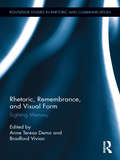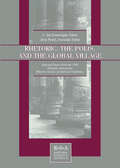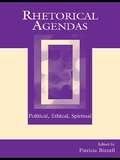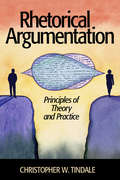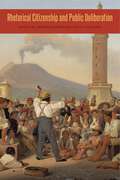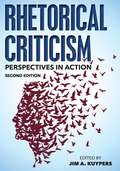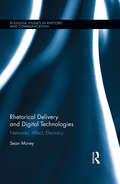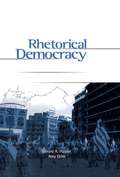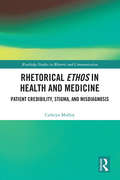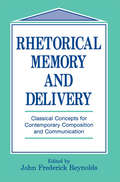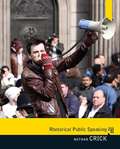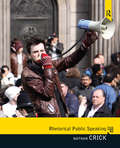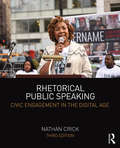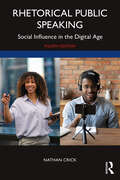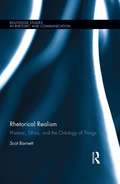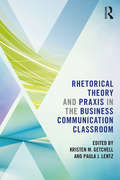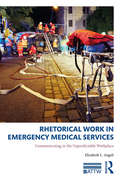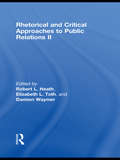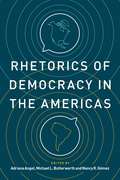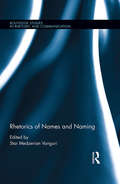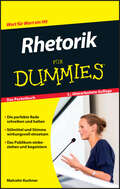- Table View
- List View
Rhetoric, Remembrance, and Visual Form: Sighting Memory (Routledge Studies in Rhetoric and Communication)
by Bradford Vivian Anne Teresa DemoThis volume offers a multifaceted investigation of intersections among visual and memorial forms in modern art, politics, and society. The question of the relationships among images and memory is particularly relevant to contemporary society, at a time when visually-based technologies are increasingly employed in both grand and modest efforts to preserve the past amid rapid social change. The chapters in this book provide valuable insights concerning not only how memories may be seen (or sighted) in visual form but also how visual forms constitute noteworthy material sites of memory. The collection addresses this central theme with a wealth of interdisciplinary and international approaches, featuring conventional scholarly as well as artistic works from such disciplines as rhetoric and communication, art and art history, architecture, landscape studies, and more, by contributors from around the globe.
Rhetoric, the Polis, and the Global Village: Selected Papers From the 1998 Thirtieth Anniversary Rhetoric Society of America Conference
by David S. Kaufer C. Jan SwearingenRhetoric, the Polis, and the Global Village represents current thought on the role of rhetoric in various disciplines, and includes such diverse topics as race, technology, and religion, demonstrating the expanding relevance of rhetoric in today's world. The essays included in this volume address the question of the polis in ancient and modern times, gradually converging with the more recent 30-year span between the decade of the Global Village and today's rhetorical rehearsals for a political global economy. Originating from the 1998 Rhetoric Society of America's biennial conference, and representing the 30-year anniversary of the organization, this volume offers to all readers the keynote lectures and selected papers celebrating the universality of rhetoric across cultures. As a benchmark for the scholarship and growth of the rhetoric discipline in recent history, it will be of great interest to scholars in classical and contemporary rhetoric, writing, and other fields in which rhetoric has attained critical significance and influence.
Rhetorical Agendas: Political, Ethical, Spiritual
by Patricia BizzellThis edited collection offers a broad consideration of contemporary rhetorical scholarship, tied to political, ethical, and spiritual themes. Originating from the 2004 conference of the Rhetoric Society of America, the contents of this volume reflects the conference themes of rhetorical agendas in current theory and research. The volume starts off with transcripts of the talks presented by the conference's featured speakers. The essays that follow are organized around five key topics: history, theory, pedagogy, publics, and gender. These chapters address subjects ranging from religious identity to civil rights; from weapons of mass destruction to literacy testing and electronic texts, reflecting the wide array of areas under study across the rhetoric discipline. With contributions from well-known scholars as well as newcomers, the breadth and diversity of this collection make a significant contribution to rhetorical scholarship, and will stimulate additional work. As such, the volume will be of interest to scholars and students in rhetoric studies in speech communication, English, and related disciplines.
Rhetorical Approaches to College Writing
by Chelsea A. Skelley Kathleen T. Leuschen Meghan McguireThe book is divided into four sections, each of which emphasizes a general framework within which to consider rhetoric. Rhetorical Foundations seeks to answer two questions: What are we studying, and why does it matter? Rhetorical Approaches examines various considerations we must make each time we communicate. Rhetorical Research offers strategies and rules of thumb for conducting responsible, effective, and comprehensive research to inform our opinions and support our arguments.
Rhetorical Argumentation: Principles of Theory and Practice
by Christopher W. TindaleThe study of argumentation has primarily focused on logical and dialectical approaches, with minimal attention given to the rhetorical facets of argument. Rhetorical Argumentation: Principles of Theory and Practice approaches argumentation from a rhetorical point of view and demonstrates how logical and dialectical considerations depend on the rhetorical features of the argumentative situation. Throughout this text, author Christopher W. Tindale identifies how argumentation as a communicative practice can best be understood by its rhetorical features.
Rhetorical Citizenship and Public Deliberation (Rhetoric and Democratic Deliberation)
by Christian Kock Lisa S. VilladsenCitizenship has long been a central topic among educators, philosophers, and political theorists. Using the phrase “rhetorical citizenship” as a unifying perspective, Rhetorical Citizenship and Public Deliberation aims to develop an understanding of citizenship as a discursive phenomenon, arguing that discourse is not prefatory to real action but in many ways constitutive of civic engagement. To accomplish this, the book brings together, in a cross-disciplinary effort, contributions by scholars in fields that rarely intersect. For the most part, discussions of citizenship have focused on aspects that are central to the “liberal” tradition of social thought—that is, questions of the freedoms and rights of citizens and groups. This collection gives voice to a “republican” conception of citizenship. Seeing participation and debate as central to being a citizen, this tradition looks back to the Greek city-states and republican Rome. Citizenship, in this sense of the word, is rhetorical citizenship. Rhetoric is thus at the core of being a citizen. Aside from the editors, the contributors are John Adams, Paula Cossart, Jonas Gabrielsen, Jette Barnholdt Hansen, Kasper Møller Hansen, Sine Nørholm Just, Ildikó Kaposi, William Keith, Bart van Klink, Marie Lund Klujeff, Manfred Kraus, Oliver W. Lembcke, Berit von der Lippe, James McDonald, Niels Møller Nielsen, Tatiana Tatarchevskiy, Italo Testa, Georgia Warnke, Kristian Wedberg, and Stephen West.
Rhetorical Citizenship and Public Deliberation: Rhetorical Citizenship And Public Deliberation (Rhetoric and Democratic Deliberation #3)
by Christian Kock Lisa VilladsenCitizenship has long been a central topic among educators, philosophers, and political theorists. Using the phrase “rhetorical citizenship” as a unifying perspective, Rhetorical Citizenship and Public Deliberation aims to develop an understanding of citizenship as a discursive phenomenon, arguing that discourse is not prefatory to real action but in many ways constitutive of civic engagement. To accomplish this, the book brings together, in a cross-disciplinary effort, contributions by scholars in fields that rarely intersect. For the most part, discussions of citizenship have focused on aspects that are central to the “liberal” tradition of social thought—that is, questions of the freedoms and rights of citizens and groups. This collection gives voice to a “republican” conception of citizenship. Seeing participation and debate as central to being a citizen, this tradition looks back to the Greek city-states and republican Rome. Citizenship, in this sense of the word, is rhetorical citizenship. Rhetoric is thus at the core of being a citizen. Aside from the editors, the contributors are John Adams, Paula Cossart, Jonas Gabrielsen, Jette Barnholdt Hansen, Kasper Møller Hansen, Sine Nørholm Just, Ildikó Kaposi, William Keith, Bart van Klink, Marie Lund Klujeff, Manfred Kraus, Oliver W. Lembcke, Berit von der Lippe, James McDonald, Niels Møller Nielsen, Tatiana Tatarchevskiy, Italo Testa, Georgia Warnke, Kristian Wedberg, and Stephen West.
Rhetorical Criticism, Second Edition: Perspectives In Action (Communication, Media, and Politics)
by Jim A. KuypersThis text provides a thorough, accessible, and well-grounded introduction to the breadth of approaches and perspectives comprising contemporary rhetorical criticism.
Rhetorical Delivery and Digital Technologies: Networks, Affect, Electracy (Routledge Studies in Rhetoric and Communication #27)
by Sean MoreyThis book theorizes digital logics and applications for the rhetorical canon of delivery. Digital writing technologies invite a re-evaluation about what delivery can offer to rhetorical studies and writing practices. Sean Morey argues that what delivery provides is access to the unspeakable, unconscious elements of rhetoric, not primarily through emotion or feeling as is usually offered by previous studies, but affect, a domain of sensation implicit in the (overlooked) original Greek term for delivery, hypokrisis. Moreover, the primary means for delivering affect is both the logic and technology of a network, construed as modern, digital networks, but also networks of associations between humans and nonhuman objects. Casting delivery in this light offers new rhetorical trajectories that promote its incorporation into digital networked-bodies. Given its provocative and broad reframing of delivery, this book provides original, robust ways to understand rhetorical delivery not only through a lens of digital writing technologies, but all historical means of enacting delivery, offering implications that will ultimately affect how scholars of rhetoric will come to view not only the other canons of rhetoric, but rhetoric as a whole.
Rhetorical Democracy: Discursive Practices of Civic Engagement
by Gerard A. Hauser Amy GrimThis collection presents theoretical, critical, applied, and pedagogical questions and cases of publics and public spheres, examining these contexts as sources and sites of civic engagement. Reflecting the current state of rhetorical theory and research, the contributions arise from the 2002 conference proceedings of the Rhetoric Society of America (RSA). The collected essays bring together rhetoricians of different intellectual stripes in a multi-traditional conversation about rhetoric's place in a democracy. In addition to the wide variety of topics presented at the RSA conference, the volume also includes the papers from the President's Panel, which addressed the rhetoric surrounding September 11, 2001, and its aftermath. Other topics include the rhetorics of cyberpolitical culture, race, citizenship, globalization, the environment, new media, public memory, and more. This volume makes a singular contribution toward improving the understanding of rhetoric's role in civic engagement and public discourse, and will serve scholars and students in rhetoric, political studies, and cultural studies.
Rhetorical Ethos in Health and Medicine: Patient Credibility, Stigma, and Misdiagnosis (Routledge Studies in Rhetoric and Communication)
by Cathryn MolloyThis book explores rhetorical ethos and its ongoing role in patients’ credibility and in misdiagnoses stemming from gender, race and class-based biases. Drawing on the concept of ethos as a theoretical framework, it explores health and mental illness across different conditions and across different methodological approaches. Extending work on ethos in clinical encounters and public discourse about biomedicine and presenting new research on the rhetoric of mental health, stigma and mental illness, the book explores how bias in clinical settings can lead to symptoms labelled "in the patient’s head" masking treatable medical problems. This notable contribution to the rhetoric of health and medicine will be of interest to all researchers and graduate students of rhetoric and composition studies, rhetoric of health and medicine, disability studies, medical humanities, communication, and psychology.
Rhetorical Memory and Delivery: Classical Concepts for Contemporary Composition and Communication (Routledge Communication Series)
by John Frederick ReynoldsWhy has classical rhetoric been a subject of such growing interest for the past ten years? Because the most exciting work in classical rhetoric has asked us to rethink classical concepts in modern terms. What's been missing, at least in book-length form, is a scholarly rethinking of rhetorical memory and delivery. As many scholars have been noting in their work for some time now, three of five classical issues -- invention, arrangement, and style -- have dominated rhetorical studies while the other two -- memory and delivery -- have largely been misunderstood or ignored. Re-examined in light of recent research on orality, literacy, and electronic technology, rhetorical memory and delivery issues can become not only central to the field but also key to the continued interest in classical rhetoric. Bringing together national scholars from a variety of related disciplines in which rhetorical memory and delivery issues matter, this collection is the only volume that examines classical and contemporary interpretations of rhetorical memory and delivery in depth and detail.
Rhetorical Public Speaking
by Nathan CrickOffers students an advanced approach to public speaking through a comprehensive discussion of rhetorical theory This text begins by addressing Aristotle's "Five Canons of the Art"-a means of covering the basics through the lens of rhetorical theory- and progresses into a sophisticated outline of understanding, constructing and delivering artful rhetoric. The book incorporates scholarship on mediated communication, pragmatic speaking genres, the rhetorical situation, and aesthetic form. Rhetorical Public Speaking aims to encourage students to be engaged citizens of society. This text is available in a variety of formats - print and digital. Check your favorite digital provider for your etext, including Coursesmart, Kindle, Nook, and more. To learn more about our programs, pricing options and customization, click the Choices tab. Learning Goals Upon completing this book, readers will be able to: Understand Aristotle's Five Canons of Rhetoric Construct and execute speeches Explore how they can use rhetorical speech in their daily lives 0205943586 / 9780205943586 Rhetorical Public Speaking Plus MySearchLab with Pearson eText -- Access Card Package Package consists of: 0205239927 / 9780205239924 MySearchLab with Pearson eText -- Valuepack Access Card 020586936X / 9780205869367 Rhetorical Public Speaking
Rhetorical Public Speaking
by Nathan CrickOffers students an advanced approach to public speaking through a comprehensive discussion of rhetorical theory This text begins by addressing Aristotle's "Five Canons of the Art"-a means of covering the basics through the lens of rhetorical theory- and progresses into a sophisticated outline of understanding, constructing and delivering artful rhetoric. The book incorporates scholarship on mediated communication, pragmatic speaking genres, the rhetorical situation, and aesthetic form. Rhetorical Public Speaking aims to encourage students to be engaged citizens of society. Upon completing this book, readers will be able to: Understand Aristotle's Five Canons of Rhetoric Construct and execute speeches Explore how they can use rhetorical speech in their daily lives
Rhetorical Public Speaking: Civic Engagement in the Digital Age
by Nathan CrickRhetorical Public Speaking: Civic Engagement in the Digital Age, Third Edition offers students an innovative approach to public speaking by employing the rhetorical canon as a means of constructing artful speech in a multi-mediated environment. It provides a foundation to guide students in understanding, constructing, and delivering messages that address matters of public concern. This edition features contemporary as well as historical examples to highlight key concepts and show how rhetoric works in practice. Each chapter includes speech excerpts, summaries, and exercises for review and retention. Students of public speaking are encouraged to employ their new skills as engaged citizens of society.
Rhetorical Public Speaking: Social Influence in the Digital Age
by Nathan CrickThis textbook offers an innovative approach to public speaking by employing the rhetorical canon as a means of constructing artful speech in a multi-mediated environment. By stressing how contemporary public speaking continues the classical art of persuasion, this book provides a foundation to guide students in constructing and delivering messages that address matters of concern and interest to their audience. This edition features contemporary as well as historical examples to highlight key concepts and show how rhetoric works in practice. It not only emphasizes the traditional skills of face-to-face oratory, but it also includes a chapter solely dedicated to highlighting the techniques and tactics of digital social influencing that adapts public speaking to online platforms. Each chapter includes speech excerpts, summaries, and exercises for review and retention. This textbook for courses in public speaking and rhetoric will particularly appeal to instructors wishing to foreground speaking as engaged citizens on public and political issues. Online resources include an instructor’s manual with discussion and test questions, video links, and sample materials.
Rhetorical Realism: Rhetoric, Ethics, and the Ontology of Things (Routledge Studies in Rhetoric and Communication)
by Scot BarnettRhetorical Realism responds to the surging interest in nonhumans across the humanities by exploring how realist commitments have historically accompanied understandings of rhetoric from antiquity to the present. For a discipline that often defines itself according to human speech and writing, the nonhuman turn poses a number of challenges and opportunities for rhetoric. To date, many of the responses to the nonhuman turn in rhetoric have sought to address rhetoric’s compatibility with new conceptions of materiality. In Rhetorical Realism, Scot Barnett extends this work by transforming it into a new historiographic methodology attuned to the presence and occlusion of things in rhetorical history. Through investigations of rhetoric’s place in Aristotelian metaphysics, the language invention movement of the seventeenth century, and postmodern conceptions of rhetoric as an epistemic art, Barnett’s study expands the scope of rhetorical inquiry by showing how realist ideas have worked to frame rhetoric’s scope and meanings during key moments in its history. Ultimately, Barnett argues that all versions of rhetoric depend upon some realist assumptions about the world. Rather than conceive of the nonhuman as a dramatic turning point in rhetorical theory, Rhetorical Realism encourages rhetorical theorists to turn another eye toward what rhetoricians have always done—defining and configuring rhetoric within a broader ontology of things.
Rhetorical Theory and Praxis in the Business Communication Classroom
by Kristen Getchell Paula LentzRhetorical Theory and Praxis in the Business Communication Classroom responds to a significant need in the emerging field of business communication as the first collection of its type to establish a connection between rhetorical theory and practice in the business communication classroom. The volume includes topics such as rhetorical grammar, genre awareness in business communication theory, the role of big data in message strategy, social media and memory, and the connection between rhetorical theory and entrepreneurship. These essays provide the business communication scholar, practitioner, and program administrator insight into the rhetorical considerations of the business communication landscape.
Rhetorical Work in Emergency Medical Services: Communicating in the Unpredictable Workplace (ATTW Series in Technical and Professional Communication)
by Elizabeth L. AngeliRhetorical Work in Emergency Medical Services: Communicating in the Unpredictable Workplace details how communicators harness the power of rhetoric to make decisions and communicate in unpredictable contexts. Grounded in a 16-month study in the emergency medical services (EMS) workplace, this text contributes to our theoretical, methodological, and practical understandings of the situation-specific processes that communicators and researchers engage in to respond to the urgencies and constraints of high-stakes workplaces. This book presents these intricate processes and skills—learned and innate—that workplace communicators use to accomplish goal-directed activity, collaborate with other communicators, and complete and teach workplace writing.
Rhetorical and Critical Approaches to Public Relations II (Routledge Communication Series)
by Elizabeth L. Toth Robert L. Heath Damion WaymerThis volume illustrates the application of rhetorical theory and critical perspectives to explain public relations practices. It provides a systematic and coherent statement of the crucial guidelines and philosophical underpinnings of public relations. Rhetorical and Critical Approaches to Public Relations II addresses the rhetorical/critical tradition’s contribution to the definition of public relations and PR practice; explores the role of PR in creating shared meaning in support of publicity and promotional organizational efforts; considers the tradition's contributions to risk, crisis, and issues dimensions of public relations; and highlights ethics, character, and responsible advocacy. It uses a rhetorical lens to provide practitioners with a sense of how their PR campaigns make a contribution to the organizational bottom line.
Rhetorics of Democracy in the Americas (Rhetoric and Democratic Deliberation #25)
by Michael L. Butterworth Adriana Angel Nancy R. GómezDemocracy is venerated in US political culture, in part because it is our democracy. As a result, we assume that the government and institutions of the United States represent the true and right form of democracy, needed by all. This volume challenges this commonplace belief by putting US politics in the context of the Americas more broadly. Seeking to cultivate conversations among and between the hemispheres, this collection examines local political rhetorics across the Americas. The contributors—scholars of communication from both North and South America—recognize democratic ideals as irreducible to a single national perspective and reflect on the ways social minorities in the Western Hemisphere engage in unique political discourses. Essays consider current rhetorics in the United States on American exceptionalism, immigration, citizenship, and land rights alongside current cultural and political events in Latin America, such as corruption in Guatemala, women’s activism in Ciudad Juárez, representation in Venezuela, and media bias in Brazil. Through a survey of these rhetorics, this volume provides a broad analysis of democracy. It highlights institutional and cultural differences in the Americas and presents a hemispheric democracy that is both more pluralistic and more agonistic than what is believed about the system in the United States.In addition to the editors, the contributors include José Cortez, Linsay M. Cramer, Pamela Flores, Alberto González, Amy N. Heuman, Christa J. Olson, Carlos Piovezani, Clara Eugenia Rojas Blanco, Abraham Romney, René Agustín de los Santos, and Alejandra Vitale.
Rhetorics of Democracy in the Americas (Rhetoric and Democratic Deliberation)
by Michael L. Butterworth Adriana Angel Nancy R. GómezDemocracy is venerated in US political culture, in part because it is our democracy. As a result, we assume that the government and institutions of the United States represent the true and right form of democracy, needed by all. This volume challenges this commonplace belief by putting US politics in the context of the Americas more broadly. Seeking to cultivate conversations among and between the hemispheres, this collection examines local political rhetorics across the Americas. The contributors—scholars of communication from both North and South America—recognize democratic ideals as irreducible to a single national perspective and reflect on the ways social minorities in the Western Hemisphere engage in unique political discourses. Essays consider current rhetorics in the United States on American exceptionalism, immigration, citizenship, and land rights alongside current cultural and political events in Latin America, such as corruption in Guatemala, women’s activism in Ciudad Juárez, representation in Venezuela, and media bias in Brazil. Through a survey of these rhetorics, this volume provides a broad analysis of democracy. It highlights institutional and cultural differences in the Americas and presents a hemispheric democracy that is both more pluralistic and more agonistic than what is believed about the system in the United States.In addition to the editors, the contributors include José Cortez, Linsay M. Cramer, Pamela Flores, Alberto González, Amy N. Heuman, Christa J. Olson, Carlos Piovezani, Clara Eugenia Rojas Blanco, Abraham Romney, René Agustín de los Santos, and Alejandra Vitale.
Rhetorics of Names and Naming (Routledge Studies in Rhetoric and Communication #29)
by Star Medzerian VanguriThis volume takes up rhetorical approaches to our primarily linguistic understanding of how names work, considering how theories of materiality in rhetoric enrich conceptions of the name as word or symbol and help explain the processes of name bestowal, accumulation, loss, and theft. Contributors theorize the formation, modification, and recontexualization of names as a result of technological and cultural change, and consider the ways in which naming influences identity and affects/grants power.
Rhetorics, Literacies, and Narratives of Sustainability (Routledge Studies in Rhetoric and Communication)
by Peter N. GogginIn this volume, rhetoricians, literacy scholars, and humanists have come together to examine the complex discursive constructions of sustainability. Touching on topics including conservation efforts in specific locales; social and political constructions of rhetorical place and space; community literacy; historical and archival analysis of institutional politics, policies, and practices concerning the environment and economic growth and development; town planning and zoning issues; and rhetorics of environmental remediation and sustainability, this collection of essays provides rhetoricians and environmentalists a window into the complex and often contradictory arena of discourse on sustainability.
Rhetorik für Dummies (Für Dummies)
by Malcolm Kushner»Eine abgelesene Rede garantiert, dass Ihnen das Publikum nicht zuhört.« (Henry Kissinger) Sei es in Sitzungen, bei Familienfeiern oder Betriebsund Vereinsversammlungen – es gibt unzählige Anlässe, bei denen Reden üblich sind, bloß halten möchte sie keiner. Malcolm Kushner hilft Ihnen, bei Ihrem nächsten Auftritt rhetorisch zu glänzen. Er zeigt Ihnen, wie Sie Ihre Rede aufbauen, den Inhalt interessant gestalten und Satzbau und Wortwahl richtig treffen. Außerdem lernen Sie, wie Sie mit rhetorischen Stilmitteln und sprachlichen Raffinessen spielend leicht umgehen. So reißen Sie Ihr Publikum mit.
